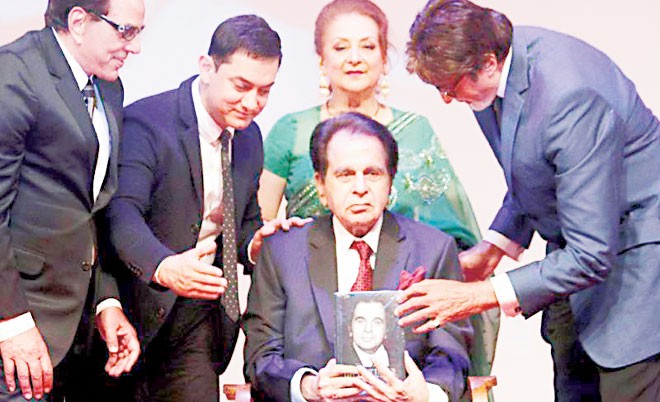
Dilip Kumar's autobiography - The Substance and the Shadow - may cover all the highlights of his life but it refrains from going beyond the plausible.

When Dilip Kumar, one of the most influential actors of the 20th century, writes an autobiography one naturally expects it to generate a lot of interest and hype. One also expects the book to provide some new information or at least some new perspective on information we already have. Sadly and most disappointingly the autobiography provides neither.
In all matters, personal and professional, the tone adopted is that of an elder statesman and while he claims he wishes to set the record straight on a number of matters where he has been misrepresented, there remain many matters that are glossed over and barely explained. He provides a view into his childhood and his early years in Peshawar and Bombay. His initial days at the Bombay Talkies and his early years as an actor make for an engrossing read, but when it comes to matters of the heart and the gossip that surrounded his leading ladies, he shies away and chooses to let us continue wondering on what really happened.
Indeed all his alleged romantic liaisons are barely touched upon. There is no description or talk of the romance with Kamini Kaushal or how the relationship with Madhubala developed. To the question of whether he was in love with Madhubala, Dilip Kumar rather coyly replies "…I must admit that I was attracted to her both as a fine co-star and as a person who had some of the attributes I hoped to find in a woman at that age and time". There is a description of the break-up with Madhubala in which the blame is placed squarely on Madhubala’s father, Ataullah Khan, who wanted to turn the proposed marriage (when was this proposed and how we will never know) into a business venture with Dilip Kumar and Madhubala both working solely for his production house.
The only portion of his personal life that gets any real meat is the description of his marriage to Saira Bano, where he talks extensively of her love for him and of his devotion to her. Though, it was a bit disturbing to read that his wife’s best quality was to bring order to his sock drawer.
During a dinner with Saira Bano, Dilip sahab mentions that he received a number of calls from a lady friend. Yet who that was and how long that relationship had been going on is never mentioned. He deals with his second marriage in a scant three short paragraphs mainly detailing how hurt Saira Bano had been and how unscrupulous persons had entrapped him.
This reluctance to share personal feelings makes this book a little stolid and perhaps a little too predictable. You will find no racy film star lifestyle and definitely no parties and casual liaisons. This is a look into another world where Dilip Kumar is a loving son, devoted brother and hardworking actor not to mention a faithful husband.
But while he refrains to talk about his personal life, he does talk of his early years in some detail. Perhaps his most treasured memory is of his time at the army canteens in Pune where he describes in some detail his work and his sandwich business.
In the early years of his career as an actor he pays tribute to the people who helped him and one can definitely get a sense of the time and way films were made. There remains a sense in reading the book that he is paying off debts to everyone who helped him and now needed to be acknowledged. Ashok bhaiyya (Ashok Kumar) and S Mukherjee Sahab receive extensive mention.
His descriptions of the process of discovering the acting method are apt and worth reading for aspiring actors as they distil the theories of Konstantin Stanislavsky for the Indian screen. Though he does not acknowledge studying any particular theory of acting, he does claim to have "…got the hang of it (acting)" by watching Hollywood actors like James Stewart, Paul Muni, Ingrid Bergman and Clark Gable and through a process of discussion and self discovery. "I understood very early on …that I had to be my own inspiration and teacher and it was imperative to evolve with the passage of time," he says.
As an actor Dilip Kumar has evolved in a career spanning over fifty years and yet apart from the early searching for the craft of the actor we learn little of his process except that he liked to work extensively on the script with the writer. He chooses not to dwell on his five-year break from films and what he did in the meantime or what his thoughts were on being on the outside of a world that had given him his identity.
One of the most interesting aspects of the book for me was the discovery of the actors’ real names from his time. Who knew that Johnny Walker was born Badruddin Qazi or that Nargis was born Fatima Rashid or indeed Meena Kumari changed her name from Mahjabeen Bano.
Overall the book provides a view into the life of a great actor with a film career starting in 1944 with Jwar Bhata and going strong till 1998 (Qila), yet the view is carefully controlled by professional and personal concerns to preserve the status of an elder in the industry. Some of the portions are great and others leave the reader wanting a lot more. I personally would have liked a little more substance with a little less consideration for how the industry and indeed the world views him as a star.
- Zain Ahmed is Artistic Director of the NAPA Repertory Theatre